By Nik Zanella
I’m on lockdown in Beijing, light years from the ocean. My flat on the 11th floor overlooks Xinyuan Road, Chaoyang district, one of most densely populated areas on the planet. But the fancy restaurants and shopping malls around my place are empty. A metropolis of 20 million is eerily deserted. Chaoyang is where all the embassies are located, and it’s possibly the safest area in the whole country.
No beach in sight, social life shrunk to zero, my visits out are short, equipped with mask, glasses and hand sanitizer, and mainly aimed to the few supermarkets still open, or to The Friendship Hospital, one of the best, assisting my wife Yang Li during her last pre-natal checks. I get my temperature checked every 20 steps, at every turn, at every door. Luckily our unborn son is big and healthy and the clinic is spotless, but we disinfect everything before getting into the house. Shoes are left out. Overcoats and mobile phones are sanitized, every item in the shopping bag is rinsed, clothing is washed and washed again.
READ MORE: Everything You Need to Know About Surfing in China
I’m desperate to get back to a life of boardshorts and flip flops. Will this ever end? I keep thinking, ‘I surfed with tiger sharks in Kenya, got shot on the beach in Sri Lanka during the Tamil war, survived pirates in Northern Indonesia, nearly drowned in 15ft swell on Madeira Island, so I’ll live through this too.’ But the biggest enemy here is psychological. Deprived of physical activity, far from the coast, depression sets in and fears are amplified.
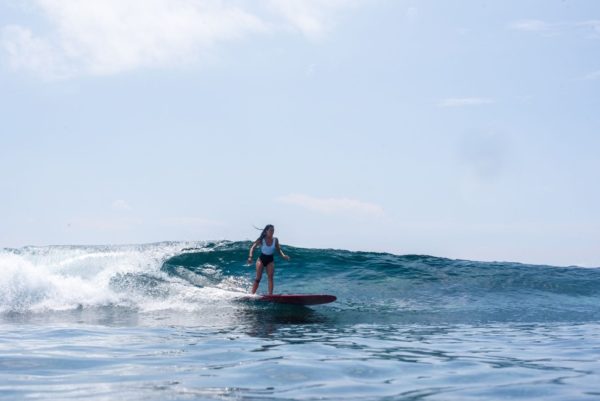
Darci Liu, one of the many surfers in China under travel restrictions due to the Coronavirus, seen here before the sickness started to spread.
My fellow surfers are on my mind constantly. The Coronavirus struck right at the beginning of the Chinese New Year holidays. Some were on the beach giving surf lessons (this is busy season for all surf instructors), but many were at home visiting relatives, often far from the coast. These are the ones paying the highest price.
The swell season started strong in Riyue Bay, the surfing capital of China. Big typhoon swells until late November, the National Championship in December, and in early January, the QS5000 Corona Open. I was on the beach on Hainan Island announcing for the WSL on January 10th when the Chinese media reported the first victim of Coronavirus 2019-nCoV, in Wuhan, 1,400 km to the north.
EXPLORE: China Travel and Surf Guide
From the top floor of the commentary booth I could contemplate the glittery, positive side of surf globalization; sharing of knowledge, overcoming of cultural barriers, pushing of performance boundaries. Over 200 surfers from all over the planet were mingling with the new breed of locals, kids like Alex Qiu at his first event of his rookie year on the QS tour. 16 locals were enrolled, a record for China.
The event was a success. Everyone left on January 13, just when the first case was diagnosed outside of the country. But from the emerald waters of Hainan, the problem still seemed remote, minimal.
Then the wheel turned, and it turned fast. Chinese Daoist philosophy focuses on the ever-changing dualism of yin and yang: darkness turns to light, wet becomes dry. Stoke morphed into fear.
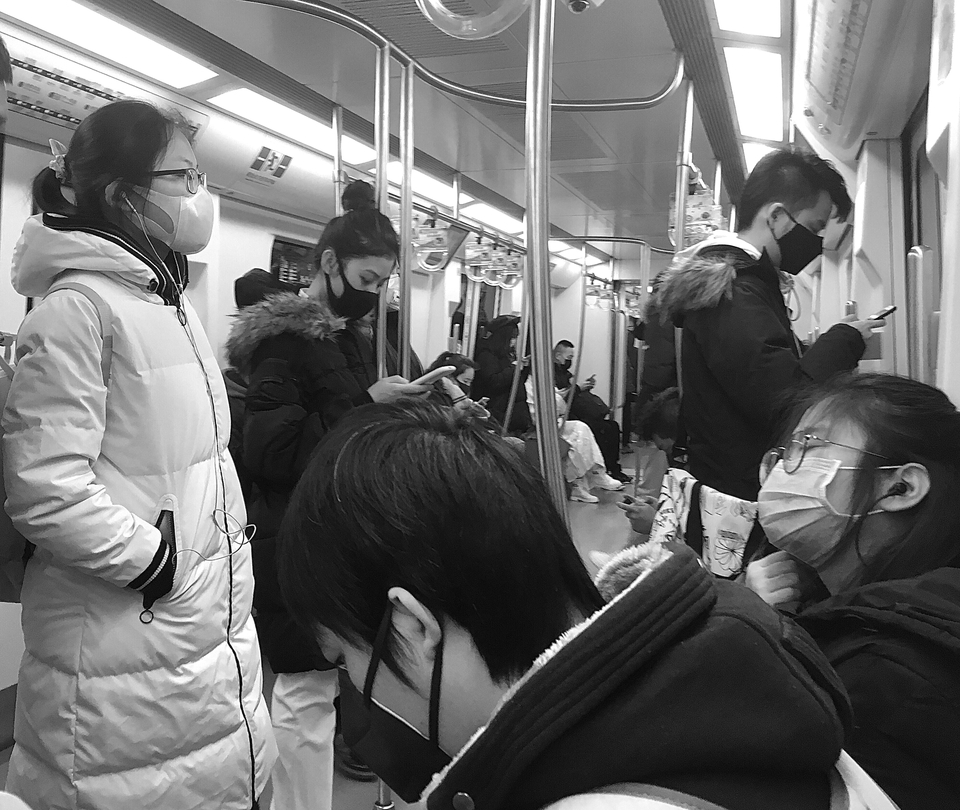
When people in certain parts of China can go out, masks and any other preventative measures are a common sight.
On January 23rd, the city of Wuhan, epicenter of the pandemic, and eight more cities in Hubei province, got locked down, and with even more cases spreading in Beijing and Shanghai, expats started fleeing the country like rats from a sinking ship. Hainan was suddenly receiving a steady influx of tourists. About 20,000 were from Wuhan. Cases of infection spread like wildfire. The surf community, like everyone else, went into panic. People started wearing masks on the beach.
Living in China has never been easy for us ‘laowai’ (the Mandarin word for ‘foreigner’). Life here is a mix of short-lived job opportunities and downright culture shock. I don’t blame those who fled. But many decided to stay and go through this storm with the people they love. I’m one of them.
READ MORE: First Look at China’s $26-Million Wavepool
On January 18th, I flew back to Beijing to assist Yang Li. She was eight months pregnant and due the first week of February. Our plan was to give birth in the capital supported by her family, then to move back to Hainan as soon as possible. Out of the grey, back into the blue. But plans are quite ephemeral in these circumstances, especially if you are addicted to salt water.
But no one is having it worse than Ye Shan, one of my students, and the only surfer from Wuhan. I gave her a call on wechat call a few days ago.
“Doctors are heroes. They don’t even have enough masks. No one from my family is infected. But the fear is real.”
“I arrived in Wuhan on the 21st, things seemed still normal,” said Ye Shan. “The plan was to spend a few days at home then take my mum and dad to my surf club in Twin Moon Bay (a surf beach in Guangdong province) and spend the holiday there. I wanted to give them their first surf lesson. But at 10 am on the 23rd they shut transportation down, roads got blocked, and the nightmare began. Ten days inside our house is like jail. I’m angry and bored out of my mind.”
Her voice was nervous, she spoke in short, fragmented sentences as if her thoughts were running faster than her tongue.
“There was a delay in the information. They waited way too long before taking action. This is what I can tell you, Nik. But what we hear from the people at the Xiehe hospital is way worse. Doctors are heroes. They don’t even have enough masks. No one from my family is infected. But the fear is real. And we are bombarded by fake news that makes us even more exasperated.”
I tried to calm her down, but I failed miserably. I asked about her dog Casa, a hyperactive border collie I played with all summer.
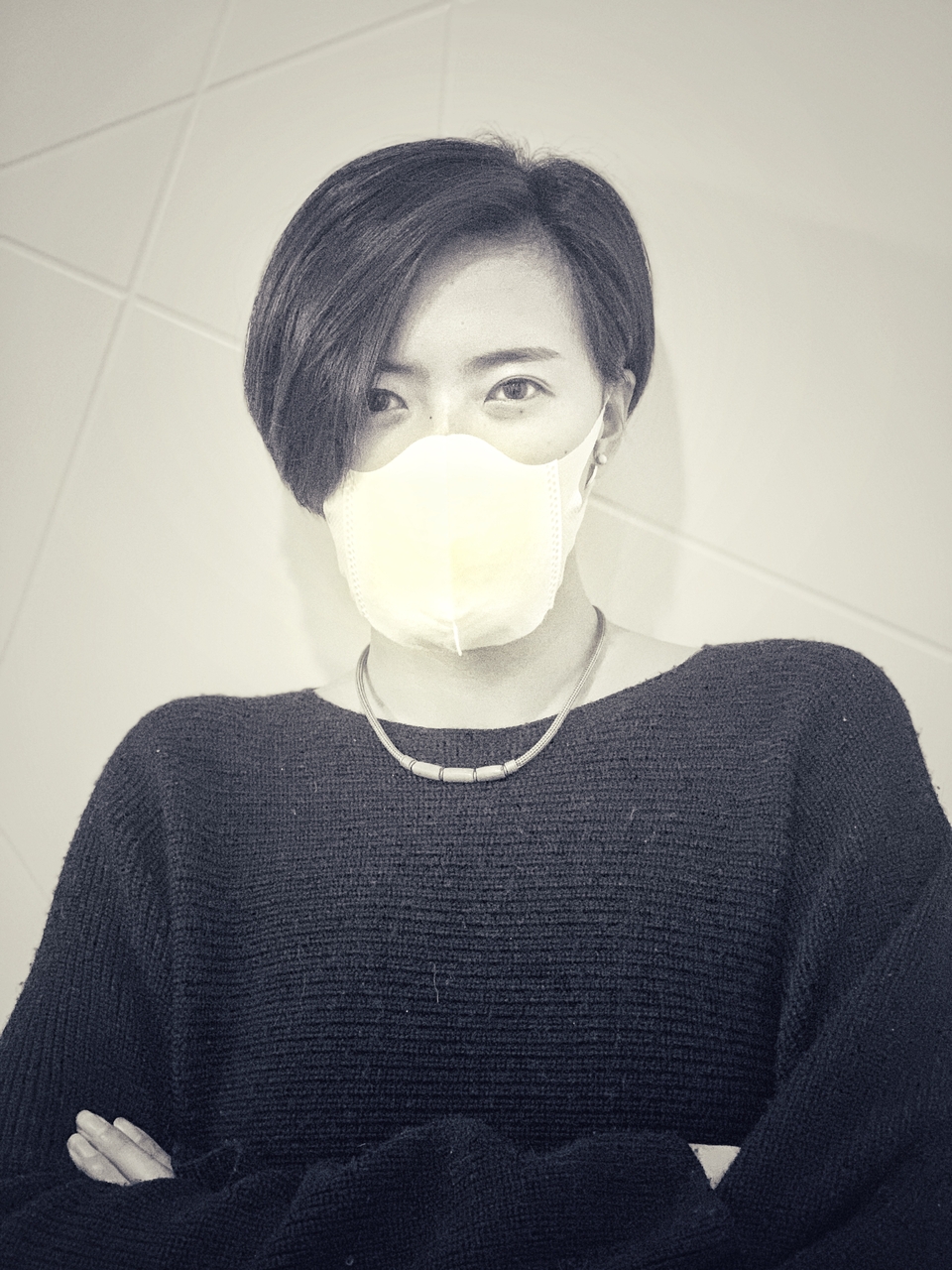
Ye Shan, the only surfer in Wuhan.
“Casa is with me and he is going mad. We cannot leave the compound. My days are spent reading, chatting on the phone and dreaming of the days when Casa was running on the beach while I was out surfing. I had planned to go to the Philippines and spend Valentine’s Day with my boyfriend. Then I had a surf trip booked to France. All cancelled. Now I go out once a week to buy food wearing a double mask and ski goggles. It’s so miserable outside. I don’t know when or how this will end.”
International travel is one of the main concerns in the media with foreigners wanting to leave and Chinese trying to reach home through closed borders. Alex Qiu has also been caught in this crossfire. He is 17, and the most talented surfer in China, with multiple national championships under his belt, often training and competing abroad.
“This was going to be my big year. But this disease is making everything impossible.”
“This was going to be my big year,” said Alex. “I trained hard, did well at the Corona Open in Riyue, and even found a new sponsor. I was supposed to fly to Australia for two consecutive events, train on the Gold Coast, then attend many more events around the world. This was going to be my rookie year on the QS tour. But this disease is making everything impossible. I’m locked in my village in Hainan. But at least I can surf.”
Small villages like Houhai, 45 km east of Sanya, and 100 km south of Riyue Bay, are enjoying a safer environment. They are easy to control. After the virus spread on Hainan, everyone got checked and monitored. Tourists from Wuhan were tracked and treated, all tourist businesses got closed, and everyone was left pretty much free to surf. As of February the 4th, Hainan has one of the lowest infection rates in the country – ‘only’ 80 cases. Guangdong province, just miles across the straight, has 797.
Longboard star Monica Guo, originally from Guangxi province in the rural southwest, but now in Houhai, explained that: “After the initial panic we now feel quite safe in the village. We have temperature checks at the entrance every time we go in and out. Houhai now feels a bit like the early days when we first moved here in 2011. We are sharing waves with just a few friends. We are definitely worried for you guys in big cities, but things are improving here.”
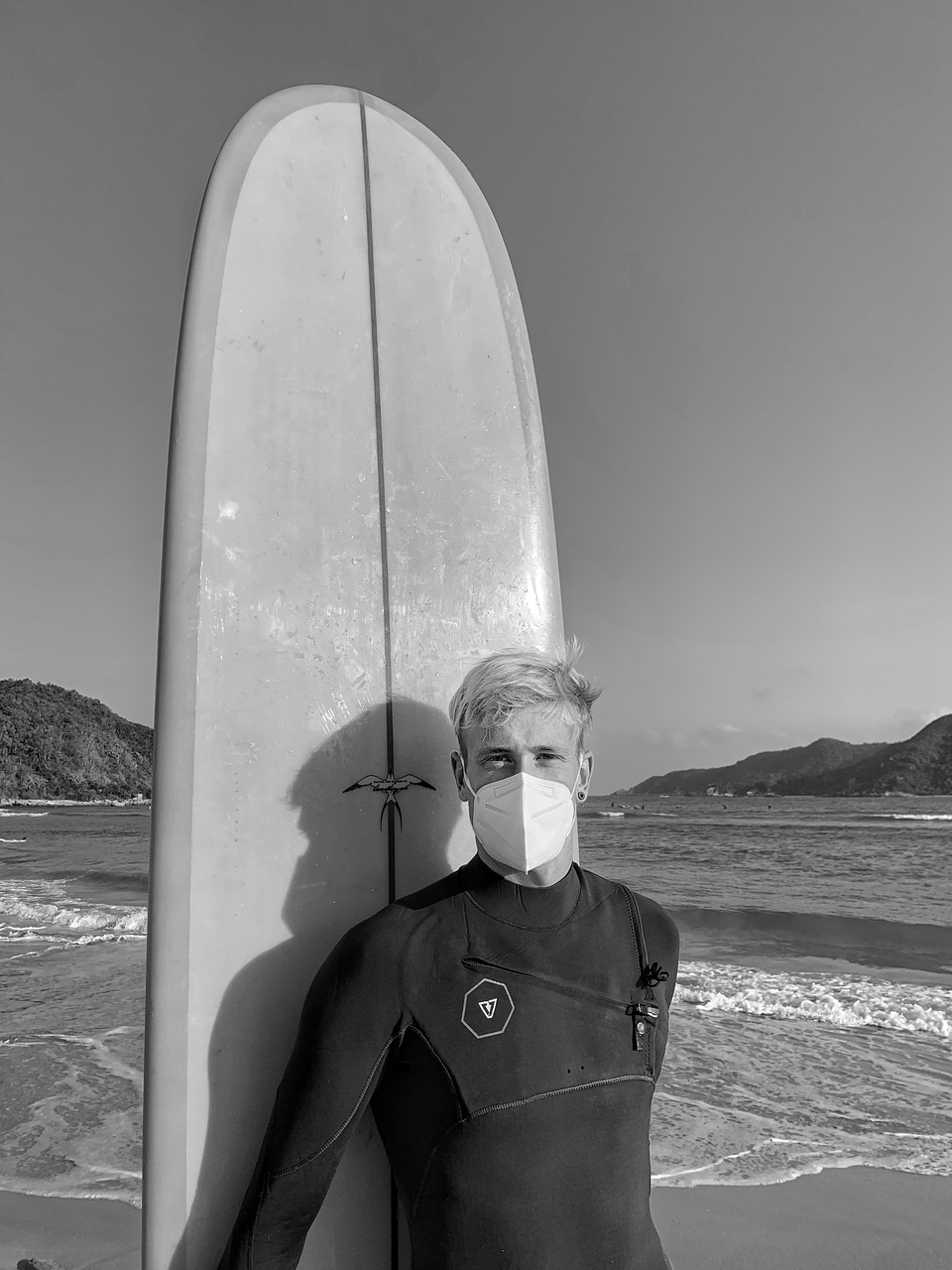
Connor Dickinson, a professional free climber from Liverpool and boyfriend to Monica Guo.
Monica’s boyfriend Connor Dickinson, a professional free climber from Liverpool in the UK, added: “Recently I almost stopped checking the news from abroad. There is an emergency of course, but things have been blown out of proportion in the West due to politics and fake news. I’m totally disgusted by all the racist comments I see on social media and even in newspapers. People need to understand that the epidemic is hurting everyone.”
However, not everyone is sharing Monica’s optimistic feelings. Darci Liu is a surfer and environmentalist originally from Enshi in Hubei province, where the Coronavirus is hitting the hardest. She now runs surf camps and an organic restaurant in Houhai, but her family is stuck right in the impact zone.
EXPLORE: China Surf Spot Map
“Since the Chinese New Year the number of deaths kept rising,” said Darci. “And things were getting worse back in Hubei. There was nothing I could do from Hainan. One of my relatives was having respiratory problems and my whole family was terrified. I was reading news, trying to understand what was real and what was fake. I went surfing a few times to calm my mind, but it didn’t work.
“One night after a surf I felt weak, fear of catching a cold set in, and I got worried. This was not the right time to catch the flu. So I locked myself indoors taking vitamins and drinking lots of water. I’m OK now. My uncle feels better now. He hasn’t been infected. People are starting to heal and getting dismissed from the hospitals. But we are still far from normal. Even if the virus hasn’t infected me physically, it has infected me emotionally.”
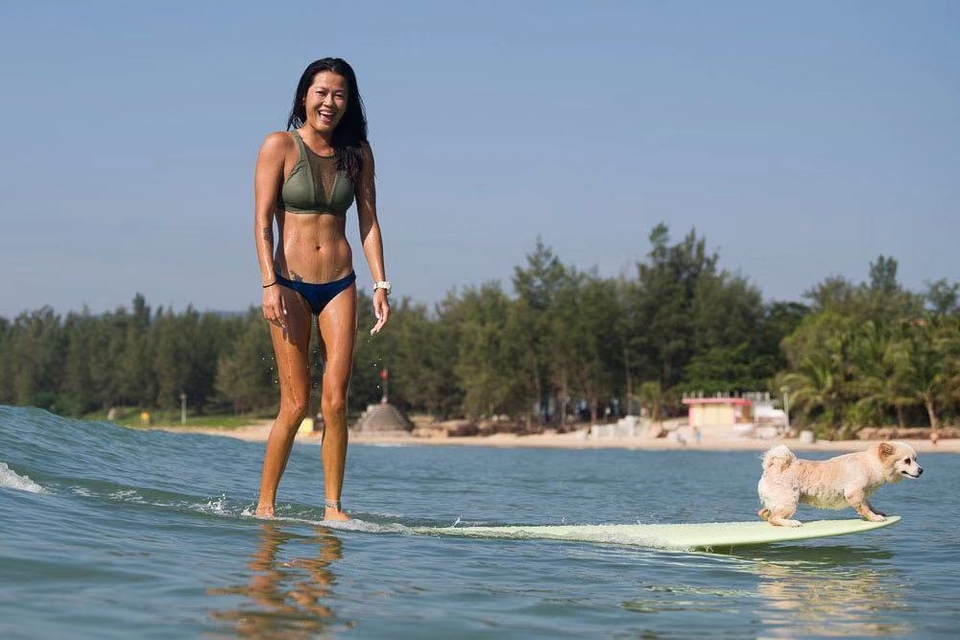
Monica Guo, longboard star from Guangxi province, in enjoying happier (and freer) days.
Darci is right. We are all emotionally infected. The surfers here are a small and tight knit community. There are no surfers among the doctors fighting the Coronavirus in Xiehe hospital, or among the scientists relentlessly working at a vaccine. We will never be remembered as heroes in this tragedy. But maybe there’s something to be learned from the frivolous act of riding waves.
Surfing teaches you how to enjoy short moments in the most hostile of environments: an enraged ocean. The virtues of adaptation and resilience have also been celebrated in Chinese society for millennia. We have something in common. We are all going under a freak set, sent in by a massive storm called Coronavirus. We just need to hold our breath, wash our hands, keep our surroundings clean, and roll with it until we, eventually, resurface.
This article was originally published on Magicseaweed.
Explorer, sinologist, surf coach, Nik Zanella has spent the last decade working in China, mapping the untapped coastline as well as at several levels of the national surf development project. Nik’s recent book Children of the Tide tells the ancient form of wave riding in the country, dating back to the 9th Century. Take a look at Nik’s book HERE or for the digital version, that’s HERE.

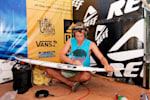

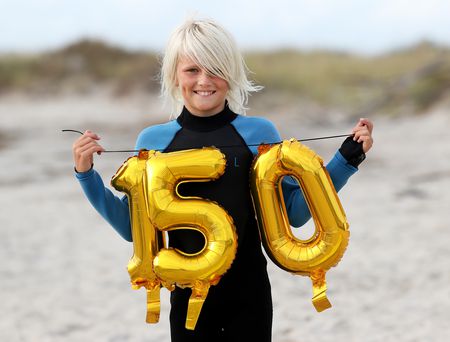

Recent Comments